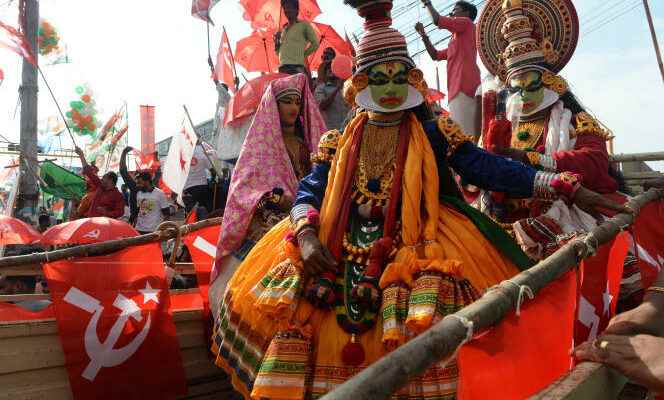Where to see communists parading together brandishing the effigies of Karl Marx, Friedrich Engels and Krishna, eighth avatar of the god Vishnu, in the parades of the party advocating dialectical materialism? Nowhere else than in Kerala, a state in southwestern India. Where, in this same country-continent, do 100% of children go to primary school, including girls? In Kerala again, the most socially advanced state in the Indian Federation. Where is the highest life expectancy (73 years in the city), universal medical protection in force and free education for all? Still in Kerala, this state which never ceases, to the greatest pride of its inhabitants and the Communist Party in power, to break records that most of the other states of India envy – not to mention others countries of the planet.
These performances on the social ground have been so striking that in the decades following the formation of Kerala as a state of the Indian Union – it was created on a linguistic basis in 1956 following the merger of the monarchies of Travancore, Cochin and the district of Malabar – many experts, including the United Nations, have not hesitated to speak of the “Kerala model”.
An unprecedented social model, but also, perhaps, a survival of a past which, elsewhere on the planet, with the exception of post-communist authoritarian Chinese or Vietnamese regimes, is now over: in 1957, the Keralans, who are not lacking not an opportunity to distinguish themselves, had already voted for the Indian Communist Party: the latter won a victory in the state marking the first success of a PC coming to power through the ballot box and not by force. Subsequently, the Communists continued to accumulate electoral success here within the framework of somewhat heterogeneous political coalitions, alternating their passages to power with the Congress Party of the Nehru-Gandhi family during the various legislative elections.
In 2021, the Communist Party of India (Marxist) or CPI (M) – the larger of the two branches of the Indian CP – won the local legislative elections for the second consecutive time, an unprecedented performance in the state for forty years. . Proof that, as the movement’s supporters think, the Indian avatar of a Marxist-Leninist formation is doing rather well in these tropical latitudes…
“Last pocket of resistance”
“Kerala is a bit like our village of Asterix”, jokes Venu Rajamony, diplomat and former Indian ambassador to the Netherlands, who we meet in his residence located under the coconut trees near one of the inlets irrigating the hinterland of Cochin, whose old The city is teeming with architectural traces of the successive presences of Portuguese, Dutch and British settlers.
You have 69.13% of this article left to read. The following is for subscribers only.
